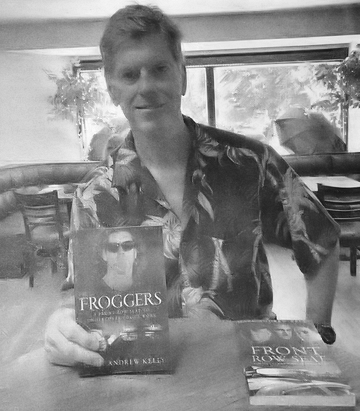
When you're an undercover cop, a
bar bust presents a few challenges.
“You're going in with a smaller
handgun, no backup ammunition, no radio, no handcuffs,” explained Mark Kelly,
who served 21 years in the East Hartford Police Department. “You're just going
in with personality. If the gun comes out, something went very wrong.”
In retirement, Kelly, a long time
Hebron resident, swapped his weapon with a pen, jotting years of police stories
down in black and white, and offering an unfiltered depiction of a job that can
be both dull and thrilling.
It's also dangerous.
“That's the fun part,” Kelly, 64
conveyed. “There's a certain pride in it.”
At the end of March, Kelly
published his second book: Froggers, A Front Row Seat To Undercover Police Work. A “frogger,” he explained, is a term derived from the more gritty side of
police work; when a person dies from a fentanyl overdose, patrol officers have
observed, their body contorts itself in such a manner that resembles a frog.
The 238-page story diverges from
narrative often sensationalized in Hollywood. Reality, Kelly said, can be much
different. With the tagline, “This isn't a crime novel, it's a cop story,” Froggers is partially a continuation of Kelly's first book released in 2020, Front Row
Seat, and fleshes out the culture of being a police officer in urban
Connecticut.
“In many ways, that book was an
answer to people asking, “Why do cops react the way they do?” Kelly said,
adding that his new book shows the follow up of the serious crime, such as a
homicide or burglary, and is based entirely on events and personalities he
encountered over his long career. “Everything in the book really happened.”
This week, Kelly sat down
with the Rivereast to discuss his newfound passion for storytelling and
why readers should pick up a copy before their next trip to the beach this
summer.
More on Froggers and Front Row
Seat can be found on Kelly's website, acopstory.com and both can be purchased
on Amazon.com, Barnesandnobles.com, booksamillion.com, stillwaterbooks.com and bookshop.org.
“This is Very Real”
Sitting inside the Marlboro Country
Bakery, it's clear that despite being retired, Kelly's old instincts are still
intact. He immediately identified where the exits were, and he picks up body
language of those in the store as he would any subject on the street.
“It's still there,” he affirmed,
referring to his law enforcement mindset, but just a bit dialed back.
Throughout his career Kelly has
always been able to switch between lifestyles - a healthy balance of leisure
and work.
“A friend of mine once said, ‘I
don't get it, you're buying drugs in East Hartford and then you come down here
and are hanging out in your boat-isn't that two different worlds?’ I go, yeah
it's kind of fun!”
After growing up in Vernon, Kelly
dropped out of college and served six years in the Marine Corps. His police
career included time as a patrol officer, investigator in the detective bureau -
vice and narcotics (the subject of Froggers), sergeant in the detective bureau,
sergeant in the patrol division and operator of the department's emergency
response team.
“I'm not a writer,” Kelly
acknowledged. “The only writing I did was police reports and warrants.”
Taking snippets and memorable
moments from his career proved to be difficult at first, at least when it came
to describing characters with in-depth detail. Over a cup of coffee, it's easy
to tell story, Kelly conveyed, but articulating nonverbal interactions and
feelings - while simultaneously being entertained - is a different skill.
“That's all new to me and I had
to learn as I went along,” he said.
Froggers follows vice and
narcotics officers in the fictional “North Hayward” going after drug dealers
and prostitutes. Three dead bodies are discovered, which sparks an
investigation with undercover officers chasing leads and combating the
seamlessly constant dangers of police work. Kelly said his latest book offers
more detail on how cases evolve and how cops manage snitches - who are
frequently unreliable - with the goal of building something strong enough to
ultimately bring to court.
For legal reasons, the names of
individuals are changed, and some characters represent a combination of
different personalities Kelly encountered. The book is fiction, but it's based
on reality, meaning the raw dialogue and detail - the other outlets may censor -
is authentic.
“I think it makes it a little
more unique,” he expressed. “What I get back from people is that this is very
real; this is a little more gritty than what you get in most novels. It's not
over the top but it's not PC.”
Kelly continued: “It's not what
the police chief necessarily wants out there, but they can't deny that's what's
going on.”
There's one story included in the book of a
drug dealer putting a gun to the head of an undercover officer, who in real
life was Kelly's partner.
“I get to put the cuffs on him,”
the character in the book, Tim, demands to his Sergeant following the incident.
“There's some ego, there's some
pride, there's some type-A personalities and sometimes you have some head-budding,”
Kelly said.
Undercover work is unlike patrol
duty or other types of policing, Kelly contended.
“You're constantly thinking on
your feet,” he said. “You're trying to be very laid back and go with the flow,
but you're also hyper observant.”
With a drug deal, obviously it's
important for the officer’s true identity to remain secret. If it doesn't work -
and with a couple of cases in the book, it doesn't go by plan -then you have to
act quickly and accordingly, Kelly said he successfully navigated these moments
- and the book highlights exactly how we managed to do so.
“You're sweating, your hands are
shaking, but you pulled it off,” he recalled.
Units used to communicate through
pagers, and an officer outside a bar or any location where undercover work was
being done would send a “911” alert to warn the officers inside to get out.
“All of us that did
undercover work are very proud,” Kelly asserted, adding how sometimes it would
take numerous pages to finally pull the crew. “We got this far, we don't want
to give up.”
Different
Than the Movies
When asked what he hopes readers
will take away from Froggers, Kelly submitted that people often have limited
experiences with cops. Most people, he said, will get pulled over at some point
in their life, and that may be their only interaction. In TV shows and movies,
Kelly said, cops are either on the take or the hero, “but in real life there is
no one person that is the go-to person.”
“Everybody has their talents,” he
said. “Some are great at doing interviews, some are great at processing crime
scenes. It's a combination of people that make a good unit.”
Kelly added that he's, “trying to get people
beyond what they see in TV or movies, or in the minor interactions” they have
with police officers.
“I get the feeling people don't know what to
do around police officers. If a uniform was to walk in right now, people would
go, ‘Why is a cop here?’ on the other side of that, ‘Everybody is staring at me.’”
Then when you're undercover,
nobody presumes you're an officer, Kelly said, emphasizing how unique the
lifestyle is and how little people know about the job.
When Kelly first started
writing Front Row Seat about eight years ago, he formed one long narrative that
he decided to break down into two books. Accordingly, Froggers includes
references in the first book and some characters carry over, but it's also
stands alone.
“It was a long process,” he said,
estimating that each book probably took 3-4 years to write while averaging 2 to
3 hours a day. “Some people say [Froggers] is better written. I like them both,
I don't have a favorite.”
Kelly joked that maybe his
writing “matured a little bit.”
Initially, his goal was to let
civilians know what the job was like, which over time morphed into drawing in
more police officers who have provided positive feedback for his stories. Kelly
explained that he tried to concentrate on cops who did a “great job” and who he
was proud to work alongside.
In his mind, the two traits that
make quality officers are having good judgment and being able to relate to
people. As an undercover officer, he was recruiting snitches constantly, which
was taxing. On average, Kelly said one out of 10 snitches would be productive
for a single case, and then just about one of ten of those individuals would go
on to be productive for even longer.
“It's kind of like sales,” he
said. “You have to go out there and pitch and pitch and pitch.”
Kelly compared writing the books
to running a marathon: “Doing it is not always that fun.”
But afterwards, when you see the
cover with your name on it, the effort becomes worthwhile, he said.
“It kind of blows you away for a little bit,”
Kelly said.
Although Kelly is taking a break
from writing, he stressed he's not out of stories, and encourage other officers
to keep a journal during their own careers; they might want to share it someday.
We have some good stories he said
people aren't going to believe it.
Perhaps, he speculated, it would
be fun to interview other people and explore their journeys.
“Everybody's got a story,”
he said.
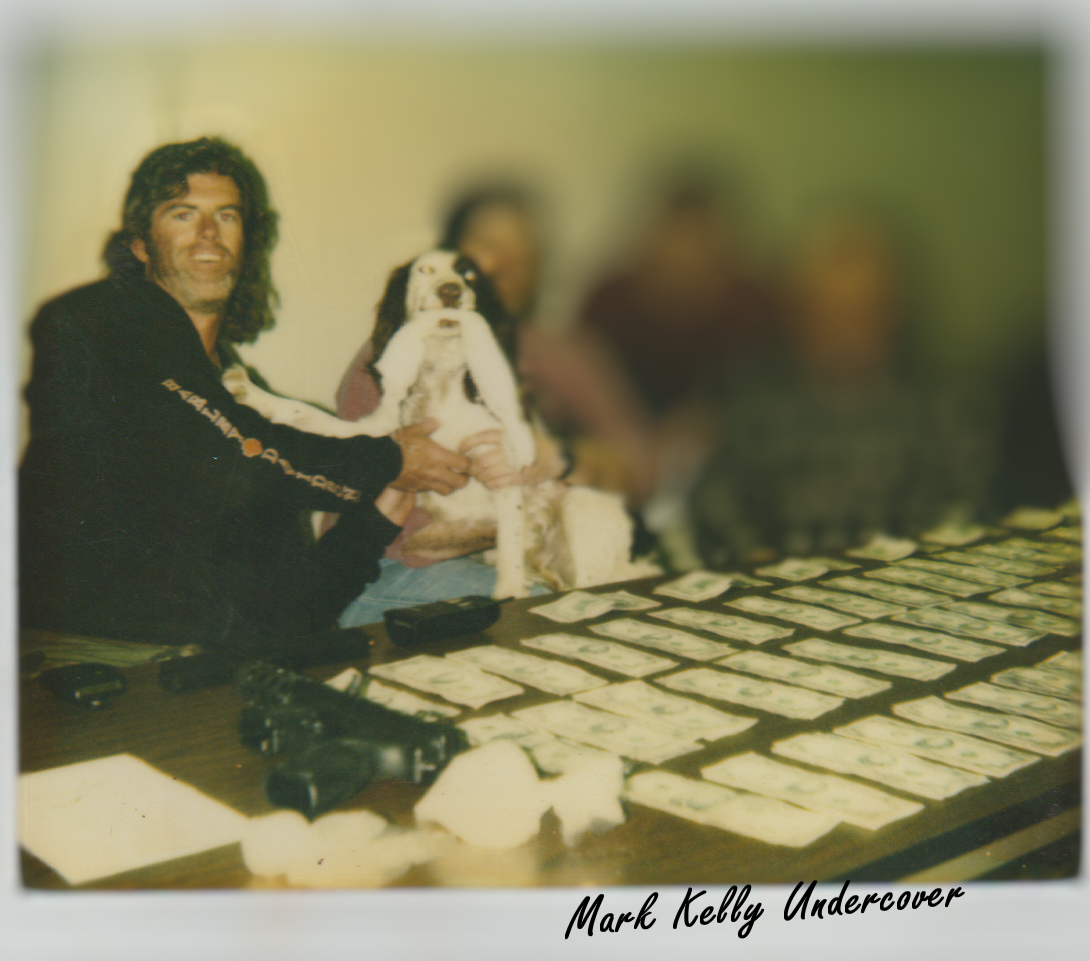
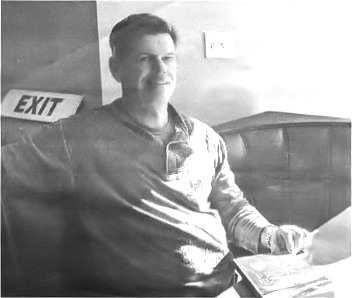
“I do believe he did capture a police officer’s experience,
different aspects of our job,” Hanlon said. “As far as your adrenaline rush,
your adrenaline dump, that occurs. [There’s] a lot of downtime, then you're
100% and you're going so I think he did a good job capturing [that].”
Cromwell resident Timothy Juergens who is also retired from
the East Hartford Force, concurred.
“The book is definitely based on day-to-day police work as
opposed to Sensationalism that TV. A lot of times portrays police work to be,”
he said. “Every day is unique. Some days are exciting, some days are not. A lot
are in between. Mark did a good job portraying that.”
Kelly, Who dropped out of college for a six-year stint in
the Marine Corps, said he taught himself to write.
As a police officer, he “banged out” reports and “moved on”,
he said. “So you're not writing feelings or novels or painting a picture.”
He said he thought he would get on his boat, sail to the
Caribbean and write the book under a palm tree. Ultimately, he wrote “here and
there” over a five-year period.
Kelly said he spent a lot of time sitting in a chair looking
out the window as he put down words to bring readers to these scenes he was
describing. He wanted them to see and hear what he saw and heard, and feel his
fear and anxiety or the adrenaline and excitement of a car chase or running
into the woods after a suspect on foot.
He said his wife read the first draft and said it needed a
lot of work; a professional editor he knew said the same. A couple of friends
who read it recommended that he separate the book into two stories, with one
dealing with patrol and the other dealing with narcotics and homicide.
“Initially it was one long convoluted narrative,” he said.
Kelly broke the work into two books and did indeed write the
first one about patrol; he is currently writing the second book.
Upon completing another draft of Front Row Seat, a
University of Connecticut journalism professor he knew read the manuscript and
said it didn't need much editing, just a bit of cleaning up, Kelly said.
Former officers who read it gave it great reviews.
“I'm hoping people who are not police officers say, ‘oh,
that's real life,’” Kelly said. “It's not what the public information officer
puts out or the chief of police puts out.”
Front Row Seat is available on Amazon.com, barnesandnoble.com, indiebound.org and booksamillion.com.
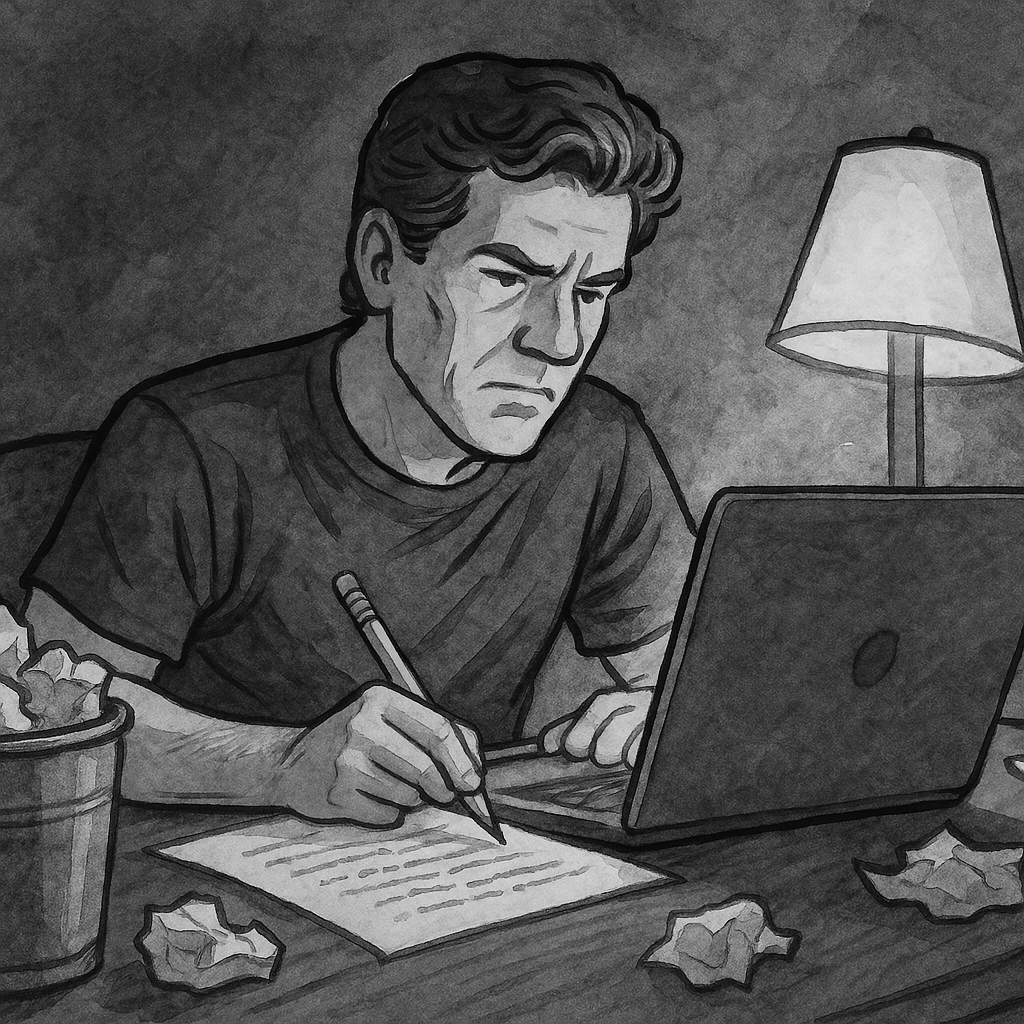
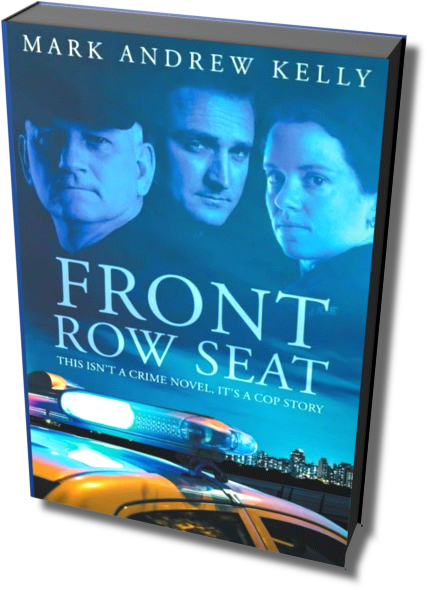
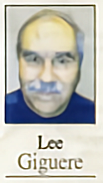
“Front
Row Seat” lives up to the promise in it's subtle; It's certainly not a crime
novel, or a novel at all. But it is a story about cops, or more accurately a
series of anecdotes drawn from a thinly fictionalized police department that
layout Kelly's view of policing and expose a clear sympathy for the challenges
he believes he and his fellow officers face and an equally clear disdain for
police administrators and much of the public that police serve.
Kelly,
a Hebron resident, is retired from the East Hartford Police Department after 21
years as a patrol officer, investigator, detective sergeant and patrol sergeant.
He calls the town he writes about North Hayward, Connecticut, and explains in
his preface that “the experiences … in the novel actually happened, just not in
the way I depict them here.”
The
officers he worked with, he writes in his preface, “are, by and large, a group
of men and women who, day in and day out, go to work, strap on a gun belt, body
armor, handcuffs and do all the best job they can with the citizens who don't
really want them there, clueless administrators, and a few colleagues who find
more satisfaction messing with their co-workers, then going out and doing
police work.”
But
while Kelly's stories often devolve into rants about all the things he dislikes
about the modern policing, they also remind his readers that cops do care about
the people they meet. In one scene, two officers are assigned to watch over a 7-year-old
who's at the police station because his mother was just found dead in her
bedroom. Officers took pains to shield him from the bad news, fed him, try to
amuse him with TV, and take his hands for a walk across their parking lot
through the fire headquarters next door to “visit the firemen and play on their
trucks.” Their playfulness extends to urging him to ring the bell outside the
fire headquarters as loud as he can (as a practical joke to annoy the firefighters,
especially a deputy fire chief who was an old neighbor of one of the cops).
While
one officer tells a trainee “one of the best skills you can have on the job is
to relate to everyone, regardless of their social status” others mock
instructors brought in for diversity training.
Though
the book lacks the plot and character development that masks most novels, it's
not that Kelly isn't an able storyteller. One chapter details a dramatic car
chase that ends with the suspects fleeing on foot:
“’Get
ready for a foot chase,’ came someone's voice over the radio. As if on cue the (pursued
car) turned right, sliding down the slope of the dike, dust and dirt kicking up
from under it as all four wheels braked hard; the driver lost control and
couldn't avoid crashing with a metallic bang into a large metal dumpster behind
a warehouse. Within the dust cloud, four doors of the wrecked (car) flew open,
and four shadows fled in different directions. Streetlights and security lights
on the building rooftops, along with cruiser headlights and flashing emergency
lights destroyed everyone's night vision, making the running shadows almost
invisible and obstacles impossible to see.” From the moment of the radio call
about a fleeing vehicle comes into the capture of its occupants, Kelly keeps up
the adrenaline-fueled drumbeat of the officers’ pursuit.
Another
chapter gives a dramatic narration of a police raid. A truly compelling chapter
is basically a thinly fictionalized retelling of the killing of East Hartford
officer Brian Aselton as he responded to a noise complaint.
Not
every episode in this cop story is as dramatic as those. Some are just sad.
After recounting a sexual encounter between two drunken men behind a dumpster
that ends with one of the men dead, the book's trainee says:
“Part
of me thinks it's sad, you know, the way the two guys behind the dumpster live.
Part of me thinks it's pretty funny, especially the way you guys handled it.”